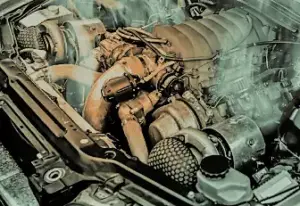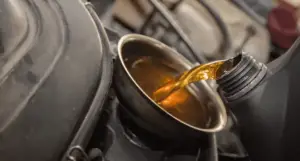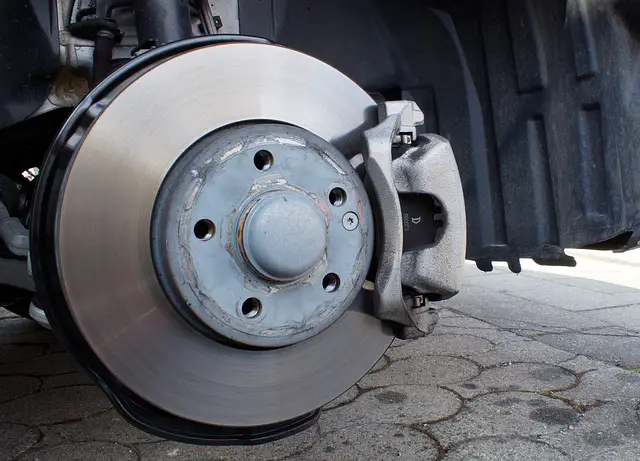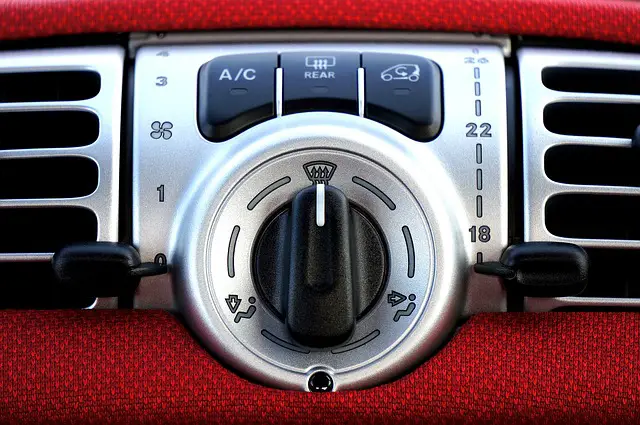Here we’ll delve into the root causes of the vinegar smell coming from your car’s ac and how to fix them. We’ll explore the different parts of your car’s air conditioning system and how they work together.
Then, we’ll provide you with some tips on how to prevent this issue from occurring again in the future.
So, let’s get started and find out what causes the vinegar smell in your car’s cabin.
Car Air Con Parts and How It Works
Let’s take a look at how your car’s air conditioning system works and the different parts that make it all possible!
The air conditioner in your car is made up of several key components that work together to cool the air before it is blown into your car’s cabin.
The first part is the air filter, which cleans the air before it enters the system.
The next part is the compressor, which compresses the refrigerant gas, making it hot and high-pressure.
The hot, high-pressure gas then flows to the condenser, which is located at the front of your car, and it cools down as it passes through the fins.
The cooled gas then moves to the evaporator, where it expands and becomes cold.
The cold gas then passes through the receiver dryer, which removes any moisture that may have been collected in the system.
Finally, the cold gas goes through the expansion tube, which reduces the pressure and causes the gas to become even colder.
The cold air is then blown into the cabin through the cabin air vents.
How to Remove The Vinegar Smell In Your Car AC
Cleaning the Air Conditioning System
You’ll want to clean out your air conditioning system to keep it smelling fresh. The first step is to replace the air filter, which can become clogged with dirt and debris over time. This can cause the system to work harder and produce less cool air.
A dirty air filter can also contribute to the vinegar smell, as it can trap moisture and bacteria that produce odors. Next, you’ll want to clean the evaporator, receiver-dryer, and condensation pan. These parts can also become dirty and harbor bacteria that cause unpleasant smells.
Use a cleaning product specifically designed for air conditioning systems, and follow the manufacturer’s instructions carefully. Be sure to also clean the drain line. Many forget this, which can become clogged with debris and cause water to back up into the system.
Regularly cleaning your air conditioning system prevents the vinegar smell and ensures that your system is running efficiently.
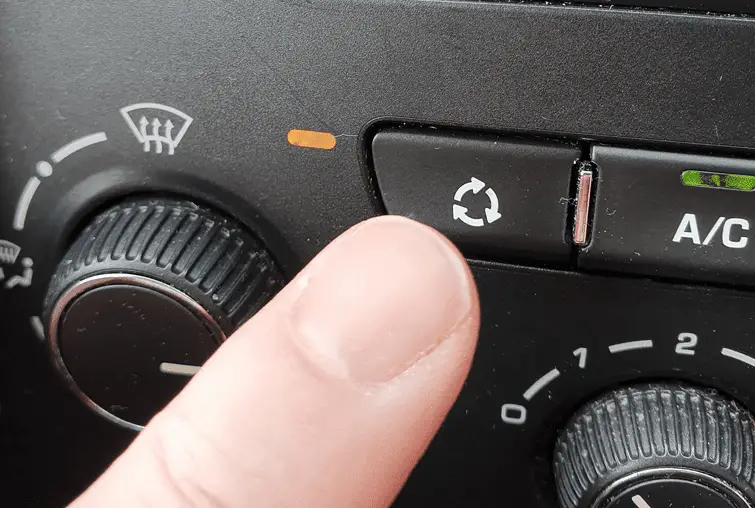
Servicing the Car AC System
If you want your car’s air conditioning system to work effectively and smell fresh, it’s important to regularly service it by taking it to a professional technician who can diagnose and fix any issues that may arise.
Here are some important things that need to be checked during a car AC system service:
- Air filter: The air filter in your car’s AC system needs to be checked and replaced regularly to prevent clogging and to ensure proper airflow. A clogged air filter can cause the AC system to work harder, which can lead to poor performance and increased fuel consumption.
- Compressor: The compressor is the heart of your car’s AC system. It needs to be checked for wear and tear, leaks, and proper lubrication. A faulty compressor can cause the AC system to blow hot air, or not work at all.
- Condenser: The condenser is responsible for removing heat from the refrigerant. It needs to be checked for leaks, clogs, and proper airflow. A faulty condenser can cause the AC system to work inefficiently, which can lead to increased fuel consumption.
- Evaporator and receiver-dryer: The evaporator and receiver-dryer are responsible for cooling the air and removing moisture from the refrigerant. They need to be checked for leaks, clogs, and proper operation. If they are not working properly, the car AC smells of vinegar, which is a sign of an air conditioner leak refrigerant.
Regularly servicing your car’s AC system will not only keep it smelling fresh, but it will also improve its performance and increase its lifespan.
Make sure to take your car to a professional technician who can comprehensively inspect and maintain your car’s AC system.
How To Prevent The Vinegar Smell In Your Car Cabin?
You don’t want your car to have that funky odor, so here are some tips to keep the stench at bay and avoid smelling like a skunk’s den on a hot day.
First, regularly check and change your car’s air filter. A clogged air filter can cause the air conditioner to work harder, leading to excess moisture buildup in the evaporator coil and condensation pan.
This moisture can mix with bacteria and mold in the air, causing that unpleasant vinegar smell. Changing your air filter every six months can prevent this buildup and keep your car smelling fresh.

Secondly, make sure your car’s drain line is clear. The drain line is responsible for removing excess moisture from the evaporator coil and condensation pan. If this line becomes clogged, water can accumulate and mix with bacteria and mold, producing the vinegar smell. To prevent this, regularly check and clean the drain line.
You can also use baking soda to absorb any unwanted odors in your car. Just sprinkle it on your car’s upholstery and carpets, let it sit for a few hours, and then vacuum it up.
Following these tips, you can keep your car smelling fresh and avoid unpleasant vinegar odors.
What Causes The Vinegar Smell?
When you’re experiencing a vinegar smell in your car, there could be several causes, each requiring a different solution.
One of the most common reasons for the smell is mold growing in the vents or ductwork.
A clogged or dirty cabin air filter could also be a culprit, as it can trap moisture and create the perfect environment for mold to grow.
Mold Growing in the Vents or Ductwork
As you breathe in the musty air creeping out of the vents, it’s like the damp, dark corners of your mind are being exposed to the light.
One possible explanation for the vinegar smell coming from your air conditioner is mold growing in the vents or ductwork. Mold thrives in damp environments, and the moist interior of your air conditioning unit may provide the perfect breeding ground for spores to take hold.
As the mold grows, it releases a distinct odor that can be described as musty or vinegar-like.
Mold can be harmful to your health, and prolonged exposure can lead to respiratory problems, skin irritation, and other health issues. To address the problem, start by turning off the air conditioner and inspecting the compressor, condenser, evaporator, and receiver-dryer for signs of mold growth.
If you’re uncomfortable doing this yourself, it’s always best to call a professional. They can thoroughly clean your air conditioning unit and ductwork to eliminate mold and any lingering odors.
Be proactive in addressing the issue to ensure you and your family can breathe easily and stay healthy.
Clogged or Dirty Cabin Air Filter
If you’re noticing a funky odor coming from your air conditioner, it might be time to check your cabin air filter. A clogged or dirty cabin air filter can cause a musty smell to circulate throughout your car’s air conditioner.
This is because the filter is designed to trap organic material, like leaves, dust, and pollen, as well as mold spores that can cause mold growth in the air conditioning system. Here are a few signs that your cabin air filter may be clogged or dirty:
- A burning smell coming from your air conditioner
- Reduced airflow from your air conditioner vents
- Increased amount of dust and debris in the cabin of your car
It’s important to replace your cabin air filter regularly, as a clogged filter can also cause an air conditioner to leak refrigerant, which can be costly to repair.
If you’re not comfortable replacing the filter yourself, it’s best to take your car to a professional mechanic who can diagnose and fix any issues with your air conditioning system. By keeping your cabin air filter clean and free of debris, you can ensure that your car’s air conditioner is working efficiently and providing clean, fresh air for you and your passengers to breathe.
Condensation Build Up
Condensation build-up can lead to mold growth in your car’s air conditioning system, which can cause health problems for you and your passengers.
This occurs because the air conditioner’s evaporator coil condenses moisture from the air, and the moisture can accumulate in the system if it isn’t drained properly.
When the moisture accumulates, it creates a breeding ground for mold. The mold then releases spores that can cause respiratory issues, headaches, and even neurological problems.
If you notice a musty or chemical smell in your car, it could be a sign of mold growth, and you should have your air conditioning system checked by a professional.

Other smells to watch out for include a rotten eggs smell, which could indicate a problem with your battery or voltage regulator, or a burning smell, which could indicate a problem with your transmission fluid or an electrical issue.
If you notice a strange smell coming from your air vents, it’s always best to have it checked out to ensure your and your passengers’ safety.
Clogged or Moldy Evaporator Coil and Fins
You may be experiencing reduced air flow or foul odors in your car due to a clogged or moldy evaporator coil and fins. This can happen when dirt and debris accumulate on the coil and fins, creating a blockage that restricts the flow of air through the system.
The moisture that builds up on the coil can also provide a breeding ground for mold and bacteria, which can cause unpleasant smells in your car. If left untreated, this issue can negatively impact the performance of your air conditioning system and potentially lead to costly repairs.
One common symptom of a clogged or moldy evaporator coil is the presence of a vinegar smell coming from your car’s air vents.
This odor can be caused by the combination of mold and bacteria that thrive in the moist environment of the evaporator coil. It can also be mistaken for other smells like battery acid or transmission fluid.
If you notice any of these smells, it’s important to have your air conditioner inspected by a professional to identify the root cause of the problem and prevent further damage to your car’s air conditioning system.
Leaves and Organic Material Build Up
It’s common for leaves and other organic materials to accumulate in your car’s air conditioning system, which can lead to reduced air flow and potential damage if left unchecked.
When these materials enter the system, they can become lodged in the expansion tube or air conditioner’s evaporator coil, causing a blockage. This blockage can lead to a buildup of moisture, which can then create a breeding ground for bacteria and fungi.
As the bacteria and fungi grow, they release a methane gas that smells like rotten eggs, giving off that vinegar-like odor.
Clogged Condensation Pan or Condensation Pipe
If you’re noticing water pooling on the floor of your car, it could be a sign that your air conditioning system’s condensation pan or pipe is clogged and in need of attention.
This can lead to a buildup of moisture and mold, which can cause a strong vinegar smell in your vehicle.
The condensation pan collects moisture produced as a byproduct of the air conditioning system, and the pipe drains this excess water out of the car. When these components become clogged, the water can’t drain properly and can lead to bad odors.
To prevent this issue, it’s important to regularly check and clean your car’s condensation pan and pipe. Here are a few steps to follow:
- Locate the condensation pan and pipe under the car’s dashboard.
- Use a wet/dry vacuum to remove any standing water from the pan.
- Clear out any debris or buildup in the pan and pipe using a pipe cleaner or similar tool.
By taking these simple steps, you can help ensure that your car’s air conditioning system is functioning properly and prevent any unpleasant odors from developing.
Other Signs of A Clogged Car AC System
Did you know that a clogged car AC system can reduce fuel efficiency by up to 20 percent, leading to increased costs at the gas pump? This is because when the AC system is clogged, it has to work harder to cool the air, which in turn uses more fuel.
In addition to reduced fuel efficiency, other signs of a clogged car AC system include weak airflow and strange noises coming from the vents.
Strange noises coming from the vents, such as hissing or rattling, can also be a sign of a clog. These noises occur because the AC system is trying to work harder than it should to cool the air.
If you notice any of these symptoms, it’s important to get your AC system checked by a professional to prevent further damage and increased costs in the future.
Car AC Smells Like Vinegar and Doesn’t Work
You may have noticed that your car’s AC system emits a pungent odor reminiscent of vinegar and isn’t functioning properly. This can be a frustrating experience, especially during hot summer months when reliable AC is paramount.
The smell can be caused by a variety of factors, each of which requires a different approach to repair. Here are some reasons why your car’s AC system might smell like vinegar and not work properly:
- Bacteria growth: When your car’s AC system isn’t used for an extended period, bacteria can grow on the evaporator coil. This can cause a musty smell that resembles vinegar. In addition to the bad smell, the bacteria can also clog the air filter and reduce the effectiveness of the AC system.
- Refrigerant leak: A refrigerant leak can also cause a vinegar-like smell. This is because the refrigerant contains a chemical called ethylene glycol, which has a sweet smell that’s similar to vinegar. A refrigerant leak can also cause the AC system to malfunction, as the refrigerant is necessary to cool the air blown into the car.
If your car’s AC system smells like vinegar and isn’t working properly, it’s important to take it to a qualified mechanic as soon as possible. The longer you wait, the more damage can be done to the system, leading to more expensive repairs.
Frequently Asked Questions
Is it possible for the vinegar smell to go away on its own without any intervention?
If you’re dealing with a vinegar smell in your car’s AC system, you may be wondering if it will go away on its own. Unfortunately, the answer is likely no.
Vinegar smells are caused by bacteria or mold growth in the system, which will continue to produce the odor until the root cause is addressed.
While you may be able to temporarily mask the smell with air fresheners or cleaning products, the only way to truly eliminate it is by cleaning or replacing the affected components.
It’s important to take action sooner rather than later, as prolonged exposure to the smell can be harmful to your health.
Will using a car air freshener help mask my car’s vinegar smell?
If you’re dealing with a lingering vinegar smell in your car, you may wonder if using a car air freshener will help mask the odor.
While air fresheners can provide a temporary solution, they may not completely eliminate the smell of vinegar.
The best way to get rid of the odor is to thoroughly clean your car’s interior, including any surfaces that may have come into contact with the vinegar.
This may involve using a combination of cleaning products, such as vinegar and baking soda, to neutralize the odor.
Additionally, keeping your car well-ventilated and avoiding leaving any food or drink spills unattended can help to prevent odors from developing in the first place.
How long does it typically take for a clogged car AC system to produce the vinegar smell?
The answer can vary if you’re wondering how long it typically takes for a clogged car AC system to produce the vinegar smell.
Generally, the smell is caused by bacteria that grow in the evaporator core. If left unchecked, the bacteria can produce the vinegar smell within a few weeks.
However, the time it takes for the smell to appear can also depend on factors such as the humidity levels in your area and how often you use your car’s AC system.
Is it safe to continue using my car’s AC system if it smells like vinegar?
The truth is, it’s never a good idea to ignore any unusual smells coming from your car. It’s always better to be safe than sorry.
Continuing to use your AC system when it smells like vinegar could be dangerous, as it could indicate a refrigerant or coolant leak. These types of leaks can cause damage to your car’s engine and potentially harm you and your passengers.
It’s best to have a professional mechanic take a look at your car to diagnose the issue and fix it before it becomes a bigger problem.
Remember, taking care of small issues now can save you from a larger headache later on.
By understanding the different parts of your car’s AC system and how they work together, you can diagnose and fix any issues before they become major problems.
Remember, a vinegar smell could be a sign of a clogged AC system, so be sure to keep an eye out for other warning signs such as reduced airflow or strange noises.
By taking care of your car’s AC system, you can ensure that it works efficiently and keeps you comfortable on even the hottest days. So go ahead, turn up the AC, and enjoy the ride!
In conclusion, taking care of your car’s AC system is essential to keeping your car running smoothly and comfortably.
By being aware of warning signs and knowing how to prevent and remove the vinegar smell, you can ensure that your car’s AC system is in top-notch condition.
So don’t hesitate to take action and keep your car cool and refreshed all year long.
There are many reasons why your car’s air conditioner smells sweetly acidic or vinegar-like.

In general, if the air from your air conditioner smells acidic, like vinegar, the problem might be caused by an ozone-emitting electric motor. Excessive moisture on the coils, a faulty filter, a clogged condensate pan, or mold in the ducting are all possibilities.
Firstly it’s rare for the vinegar smell to be dangerous; it’s more unpleasant and can be a bit embarrassing if you have friends or family with you.
During the fall- especially but not exclusively -your car’s air-con system is more likely to suck in plant matter. As plant matter breaks down, it gives off a musty smell and often a vinegar scent.
Often this depends on the plant that is being broken down.
This debris will break down further to mold and often sit in the car tubes and ducts – we’re not talking about large amounts here- and rot away.
Come the spring and summer, when we need our air con again, we get a very vinegary smell out of the vents.
So How Do You Fix A Vinegar Smell In Your Cars’ AC?
Turn off Aircon Recirculating.
If you always have the same air recirculating throughout the air-con system and your cabin, it can cause a build-up of mold within the system.
Allowing the aircon to pull its air from the outside will often clear away the mold and eliminate the smell of vinegar. This is the quickest and simplest fix. Often works too.
If not…..
Clean the Vents, Ducts, and Slats.
Using general cleaning products in your car’s air con system is never a good idea. Some do have chemicals that shouldn’t be breathed in – especially through an air-con system.
There are specific aircon cleaning products that work well. They are manufactured as not to cause damage to your car’s delicate air con components and are usually very effective and fast-acting.
They work by neutralizing the mold and also preventing it from coming back.
If that hasn’t worked
Leave Car Running Without AC on.
The intake hose also provides an environment for mold and mildew to grow. Most car manufacturers recommend leaving the engine running with the fan on for a couple of minutes but turn the air con off when parked.
This will dry out the hose – as it’s not getting moisture from the aircon- and prevent mold from getting a hold. Of course, it’s not pleasant when it’s 90 degrees without air con, but it might stop that vinegar smell.
Check the Car’s Cabin Filter.
Most modern cars have them. Its job is to stop debris and dirt from entering the cabin through the vents. When they become clogged, they let debris and plant matter through.
Most cabin filters are reusable and can be beaten to get the dust out. Often though, they are cheap to replace.
Cabin filters are located either behind the glove box or underneath the dashboard. In some cars, they are located along the HVAC lines in the engine bay.
A new cabin air filter costs between $15 – $25. If you require fitting, expect to pay $20-$50 for labor.
Most car manufacturers recommend replacing every 12,000 to 15,000, although it may be better to replace them more often if you live in a leafy area of town.
Most times, this will eliminate the vinegar smell in your car ac.
If not, though,
Clean the Cars HVAC Evaporator, Condensor, and Fins.
To get to these parts may require taking off the dash or removing parts under the hood. The video explains a DIY, cheaper fix in detail. Most people either accept the vinegar smell and give up at this stage or take their car to a car shop.

Usually, there is nothing wrong with the parts, and a simple deep clean of the evaporator and condenser will get the air-con system working like new again.
A car aircon service, including regas will cost between $70 and $200, including labor. This excluding the cost of any parts that may need to be replaced.
Check for Leaking Battery Acid.
Now that you’ve ruled out a plant/mold issue, it’s time to check under the hood.
Note: Battery acid is damaging to humans. Please don’t touch or let it come into contact with you.

Battery acid can give off a sulfur acid smell that many people describe as smelling like vinegar. Battery acid should be contained inside the battery, but it can leak out.
The battery is positioned relatively close to the air vents under the hood, so any rotten egg battery smell will likely be sucked into the vents and the cabin.
Look for a swollen battery and a discharge on top of it where the cell caps are located.
If you see battery acid, it’s time for a new battery.
A new car battery costs between $100 and $275 depending on the brand of battery and the make and model of the car.
Batteries are easy to fit, but if it’s leaking, it’s best to get a mechanic to remove the old one for you.
If your battery is dead but not leaking, try these dead car battery tricks to get you moving again.
And finally…
Check for Faulty Catalytic Converter.
Sometimes described as an egg or a sulfur smell, a damaged catalytic converter can leak fumes before they reach the tailpipe.
You are unlikely to get the smell into your car when driving, as the fumes would blow away when the vehicle moves forward.

However, when parked, the fumes can find their way into the intake hose and through your car’s air vents.
The catalytic converter smell can be more toxic than vinegar, but it’s worth mentioning as it is poisonous and should be quickly investigated by a mechanic.
A leaky car battery is possible but not too expensive to replace, and the catalytic converter is the most expensive fix. Still, if the smell is described as a vinegar smell – rather an eggy sulfur smell, it’s unlikely to be that.
These are the five reasons why your AC smells of vinegar. Most are very inexpensive – or may cost nothing to put right – and require a simple clean or a flush through.
The vinegar smell is usually caused by mold that has formed on dust and plant debris within the cabin air vents that has accumulated there over time. A thorough clean of the hoses and vents will remedy it.
Is your aircon making a weird loud noise? Discover the causes and fixes in our complete Guide to Aircon Noises – With Fixes
Sometimes a car’s aircon smells musty. We’ve written a guide to troubleshoot and fix it that issue too! You can read it here Complete Guide to Why a Car AC Smells Moldy
Has your car started blowing out hot air? Find out why in our complete guide to Why Your Cars Aircon is Hot


